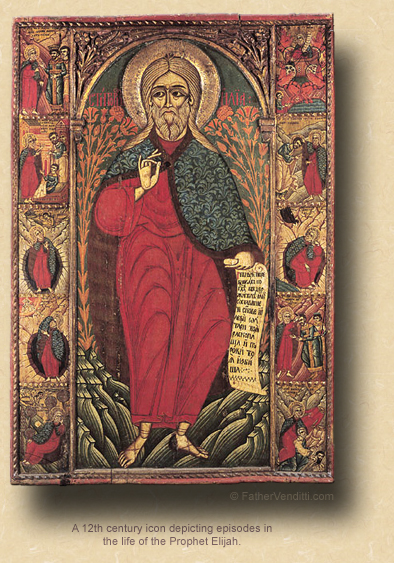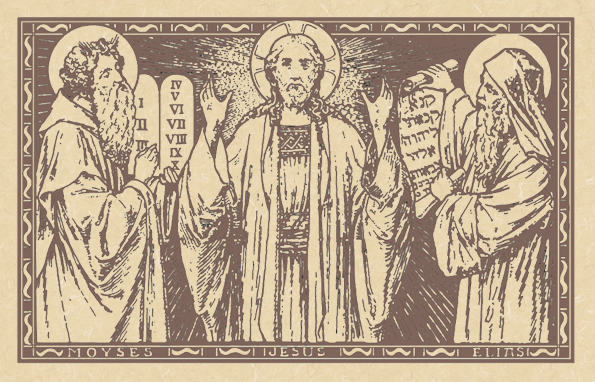The Answer Is Blowin' in the Wind.
The Tenth Friday of Ordinary Time.
Lessons from the secondary feria, according to the ordinary form of the Roman Rite:
• I Kings 19: 9, 11-16.
• Psalm 27: 7-9, 13-14.
• Matthew 5: 27-32.
The Third Class Feast of Saint Margaret of Scotland, Widow.*
Lessons from the common, according to the extraordinary form of the Roman Rite:
• Proverbs 31: 10-31.
• Psalm 44: 3, 5.
• Matthew 13: 44-52.
The Third Friday of the Apostles Fast; and, the Feast of the Holy Martyr Timothy, Bishop of Prusa.
Lessons from the pentecostarion, according to the Ruthenian recension of the Byzantine Rite:
• Romans 11: 25-36.
• Matthew 12: 1-8.
FatherVenditti.com
|
 8:34 AM 6/10/2016 — Yesterday we took a break from looking at the adventures of the Prophet Elijah in the First Book of Kings to visit with our old friend, Saint Ephrem; but, the day before that, the prophet tangled with the priests of Baal, and we had already looked at the mystical meaning of his two encounters with the widow of Zarephath, in one of which he actually raises her son from the dead. At the end of today's first lesson, God sends him to Damascus where he will anoint Jehu King of Israel, and Elisha as his own successor as God's prophet; but, before that, he has one more encounter with God which is clearly the most mystical and, for us, probably the most significant, if not for the very fact that it's reported so subtly and without much ceremony. And we've actually looked at it before. 8:34 AM 6/10/2016 — Yesterday we took a break from looking at the adventures of the Prophet Elijah in the First Book of Kings to visit with our old friend, Saint Ephrem; but, the day before that, the prophet tangled with the priests of Baal, and we had already looked at the mystical meaning of his two encounters with the widow of Zarephath, in one of which he actually raises her son from the dead. At the end of today's first lesson, God sends him to Damascus where he will anoint Jehu King of Israel, and Elisha as his own successor as God's prophet; but, before that, he has one more encounter with God which is clearly the most mystical and, for us, probably the most significant, if not for the very fact that it's reported so subtly and without much ceremony. And we've actually looked at it before.
Even though there were other prophets before Elijah, and certainly a lot of lesser prophets after him,—including Elisha whom he will meet in tomorrow's lesson and anoint as his replacement—no other prophet had the kind of intimacy with God that Elijah enjoyed, unless one wants to count Moses himself; and, the brief and low-key episode we read today, which begins the Missal's wrap-up of our visit with him, illustrates what an extraordinary experience of the presence of God he had. Having concluded pretty much everything that God had initially commanded him to do, we find Elijah wandering around looking for God to see if there is anything he's left undone, and what happens to him here is a spiritual lesson for us if ever there was one. He's looking for God, but he's looking in all the wrong places. He’s looking for God in the magnificence of nature, in all the grandeur of the desert around him. And he comes to a cave and goes inside, and there we read:
Then word came to him to go out and stand there in the Lord’s presence; the Lord God himself would pass by. A wind there was, rude and boisterous, that shook the mountains and broke the rocks in pieces before the Lord, but the Lord was not in the wind. And after the wind, an earthquake, but the Lord was not in the earthquake. And after the earthquake a fire, but the Lord was not in the fire. And after the fire, the whisper of a gentle breeze. Elias, when he heard it, wrapped his face in his mantle… (1 Kings 19: 11-13 Knox).
It’s an extraordinary passage, because it begs the question: where are we looking for God? In some magnificent sign, some overwhelming manifestation of his power? And when we don’t see that, do we then conclude, as many people have, that there is no God? Look at our Lord. When confronted with the prospect that Jesus was the Messiah, what do the synagogue leaders say? “This can’t be the Messiah. This is just some ordinary Joe from Nazareth. The Messiah will be a great man.” Well, our Lord is a great man, and much more, but not as they were defining greatness. God came to earth as the whisper of a gentle breeze: the Son of a carpenter, from their own country.
So, where are we looking for God? For those of us who are Christians, there’s a great temptation to view the spiritual traditions of our own faith as old and passé, even in a Christian tradition as spiritually rich as our own Catholic Tradition. A number of years ago, when I was a parish priest, I gave the parish a presentation about a spiritual tradition in the Church known as Hesychaism, a very mystical approach to prayer dating from the earliest days of Christianity in the East. And I did that because I had some people in the parish who had a tendency to latch on to whatever new wave guru type spirituality they read about in the Ladies Home Journal in their search for inner peace. But God isn’t in these new and fantastic things. God is here, where we have always known him to be: in the Blessed Eucharist, in the sacrifice of the Mass, in the sacraments of the Church, in the images of the saints, in the reading of the Scriptures, in the daily prayers of faithful Catholics who know no more than what they learned in Sunday School or read in their catechism—in the whisper of a gentle breeze. Nothing new, nothing great, but in the things with which we are all familiar.
The life of grace—the spiritual life—the life of inner peace and holiness is available to all of us. But we cannot look for it where it is not. We find it in the Mysteries and traditions of the Church to which we already belong. And we don’t have to be perfect to benefit from them. Our lives can be as imperfect and green and damp as the wood on Elijah’s altar from last Wednesday's lesson, and God can still grace us, if we are willing for Him to do so, if we are willing to make an effort to turn away from the world and the things of the world and turn our attitude to heaven, living our lives for that goal rather than for some earthly reward.

* A descendent of the Saxon Royal line born in Hungary, Margaret was married to Malcolm III, King of Scotland. Her long reign of thirty years was illustrious for her inexhaustible charity to the poor. She died in 1093, and is honored among the patrons of Scotland.
|

